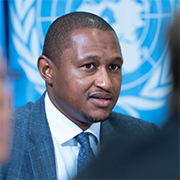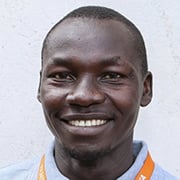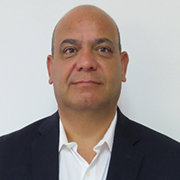Resilience and Inclusion
Tuesday 29 September 2020, 13:00 - 14:30 (CEST)
Tuesday 29 September 2020, 13:00 - 14:30 (CEST)
Background
While the virus is blind to borders or socio-economic status, race or national origin, it has had a disproportionate impact on the most vulnerable people in the world. Among them are forcibly displaced who typically find work in the informal economy and are invariably the first to lose their livelihood when the economy declines. Restrictions of movements, lockdowns and loss of income, evictions, school closures, denial of access to health and other basic social services as well as rising xenophobia have a profound and probably long-term negative socio-economic impacts on vulnerable groups, especially those of concern to UNHCR. The session will unpack this statement in three sections:
First, informed with data collected worldwide, panelists will discuss the socio-economic impact of the pandemic on refugees, other displaced populations and the stateless, looking at the importance of supporting the resilience in the short-medium and longer-term. Second, panelists will discuss opportunities and challenges of inclusion of especially refugees, but also other displaced populations, looking at for example, links to economic stimulus measures, social protection and healthcare responses. Third, good practices and lessons learned so far in the pandemic response will be showcased, contributing to recommendations on how to prepare for and respond to this and future pandemics.
 Dr. Mamadou Dian Balde is Deputy Director of UNHCR’s Division of Resilience and Solutions (DRS). In this capacity, he oversees and supports UNHCR’s global programmes on education, livelihoods, and economic inclusion, social protection, etc. Prior to his current responsibilities, Mamadou has worked with UNHCR for over 20 years, with field postings in Africa, Asia, and the organization’s headquarters in Switzerland. Mamadou Balde holds a Ph.D. in International Law, from the Université catholique de Louvain, in Belgium, and has researched and taught International Human Rights Law.
Dr. Mamadou Dian Balde is Deputy Director of UNHCR’s Division of Resilience and Solutions (DRS). In this capacity, he oversees and supports UNHCR’s global programmes on education, livelihoods, and economic inclusion, social protection, etc. Prior to his current responsibilities, Mamadou has worked with UNHCR for over 20 years, with field postings in Africa, Asia, and the organization’s headquarters in Switzerland. Mamadou Balde holds a Ph.D. in International Law, from the Université catholique de Louvain, in Belgium, and has researched and taught International Human Rights Law.
 Raouf Mazou took up his appointment on 1 February 2020, bringing 28 years of experience with UNHCR. His various assignments have enabled him to garner expertise in such areas as emergency response, repatriation, and the development of strategies aimed at bridging the gap between relief and development. Mazou previously served as Director of UNHCR’s Africa Bureau in 2019 and as UNHCR Representative in Kenya for over five years. Prior to that, he was a Deputy Director in the Africa Bureau, covering the East and Horn of Africa. Other senior positions he has held at UNHCR include Deputy Director of the Division of Operations Support and Head of the Emergency and Security Service, a role in which he oversaw the organization’s global emergency management and staff security interests. Mazou joined UNHCR in 1991 in the Great Lakes Region and subsequently served in West Africa, supporting the agency’s response to the Liberian and Sierra Leonean refugee crises. He holds a Bachelor’s degree in law from the University of Geneva, Switzerland. He is fluent in English and French.
Raouf Mazou took up his appointment on 1 February 2020, bringing 28 years of experience with UNHCR. His various assignments have enabled him to garner expertise in such areas as emergency response, repatriation, and the development of strategies aimed at bridging the gap between relief and development. Mazou previously served as Director of UNHCR’s Africa Bureau in 2019 and as UNHCR Representative in Kenya for over five years. Prior to that, he was a Deputy Director in the Africa Bureau, covering the East and Horn of Africa. Other senior positions he has held at UNHCR include Deputy Director of the Division of Operations Support and Head of the Emergency and Security Service, a role in which he oversaw the organization’s global emergency management and staff security interests. Mazou joined UNHCR in 1991 in the Great Lakes Region and subsequently served in West Africa, supporting the agency’s response to the Liberian and Sierra Leonean refugee crises. He holds a Bachelor’s degree in law from the University of Geneva, Switzerland. He is fluent in English and French.
 Arthur Alik-Lagrange is a Senior Economist with the Center.
Arthur Alik-Lagrange is a Senior Economist with the Center.
He joined the World Bank in 2016 as a poverty economist with the Africa Chief Economist unit, working on the impact evaluation of Gender and Social Protection programs for the ultra-poor, including in fragile countries and forced displaced populations.
He holds a Ph.D from the Toulouse School of Economics, a M.Sc from the Humboldt University of Berlin and a degree in statistical engineering from the ENSAE, Paris.
 Working in HIAS, as head of the Economic Inclusion Area, Galo is responsible for leading the technical team across the agency operations in the world. With more than 12 years of experience developing and designing high quality programmes across livelihoods, cash and voucher assistance and education sectors for vulnerable populations, Galo has carried out the implementation of the Graduation Model for refugees and other economic empowerment interventions, especially for women, girls and youth people. Galo holds studies in International Relations, Development, Corporate Social Responsibility and sustainability and he has worked across four continents with a particular emphasis in Latin America and the Caribbean.
Working in HIAS, as head of the Economic Inclusion Area, Galo is responsible for leading the technical team across the agency operations in the world. With more than 12 years of experience developing and designing high quality programmes across livelihoods, cash and voucher assistance and education sectors for vulnerable populations, Galo has carried out the implementation of the Graduation Model for refugees and other economic empowerment interventions, especially for women, girls and youth people. Galo holds studies in International Relations, Development, Corporate Social Responsibility and sustainability and he has worked across four continents with a particular emphasis in Latin America and the Caribbean.
 Ahmad is an award-winning social entrepreneur and author focused on supporting vulnerable communities, people in conflict, and forced displacement to access entrepreneurship. He is a Regional Manager at Techstars, a global platform for innovation and investment. Since 2012, he has helped hundreds of Syrians gain access to entrepreneurship opportunities and build a supportive environment. As the Startup Roadshow entrepreneurship program Director and founder of Startup Syria. He has written two books, "Entrepreneurship In Conflict Zones" and "Entrepreneurship in Exile," to shed some light on Syrian founders' status quo, in conflict zones, and as refugees in host countries.His work has appeared on The World Economic Forum, Forbes, The Guardian, Financial Times, The Wall Street Journal, Huffington Post, and more. Also, presented in top stages, including the Palais des Nations (UN), EU Parliament, ESCWA, World Bank, Wilton Park, Google, SPARK Ignite, Techfugees summit, Startup Istanbul, and many more.
Ahmad is an award-winning social entrepreneur and author focused on supporting vulnerable communities, people in conflict, and forced displacement to access entrepreneurship. He is a Regional Manager at Techstars, a global platform for innovation and investment. Since 2012, he has helped hundreds of Syrians gain access to entrepreneurship opportunities and build a supportive environment. As the Startup Roadshow entrepreneurship program Director and founder of Startup Syria. He has written two books, "Entrepreneurship In Conflict Zones" and "Entrepreneurship in Exile," to shed some light on Syrian founders' status quo, in conflict zones, and as refugees in host countries.His work has appeared on The World Economic Forum, Forbes, The Guardian, Financial Times, The Wall Street Journal, Huffington Post, and more. Also, presented in top stages, including the Palais des Nations (UN), EU Parliament, ESCWA, World Bank, Wilton Park, Google, SPARK Ignite, Techfugees summit, Startup Istanbul, and many more.
 Julienne founded African Entrepreneur Collective in 2012, after living and working in more than 20 countries in Africa, and being inspired by the incredible potential for young people across the Continent to solve their own problems, if only provided the tools to do so. Since founding AEC, Julienne has led the strategy and fundraising efforts to expand across Rwanda and Kenya, building AEC’s in-house loan fund, developing SME programming, and most importantly, developing private sector approaches to support refugee livelihoods through entrepreneurship. In the next 3 years, AEC will be in 5 countries, supporting more than 35,000 entrepreneurs. Prior to AEC, Julienne served as the Director of Development and Communications at College Track, a national after-school program in the US, and has held leadership and strategic consulting positions at a number of organizations including African Leadership Academy, Capital Partners for Education, and Yale University. Julienne is a 2015 Echoing Green Fellow for Social Enterprise, and she has a BA in African History from Georgetown University and an MBA from Yale School of Management.
Julienne founded African Entrepreneur Collective in 2012, after living and working in more than 20 countries in Africa, and being inspired by the incredible potential for young people across the Continent to solve their own problems, if only provided the tools to do so. Since founding AEC, Julienne has led the strategy and fundraising efforts to expand across Rwanda and Kenya, building AEC’s in-house loan fund, developing SME programming, and most importantly, developing private sector approaches to support refugee livelihoods through entrepreneurship. In the next 3 years, AEC will be in 5 countries, supporting more than 35,000 entrepreneurs. Prior to AEC, Julienne served as the Director of Development and Communications at College Track, a national after-school program in the US, and has held leadership and strategic consulting positions at a number of organizations including African Leadership Academy, Capital Partners for Education, and Yale University. Julienne is a 2015 Echoing Green Fellow for Social Enterprise, and she has a BA in African History from Georgetown University and an MBA from Yale School of Management.
 Abdullahy Kuku Ali is a Business Development Advisor at AEC Kenya where he supports a portfolio of more than 200 refugee and host community entrepreneurs with business trainings and consulting.
Abdullahy Kuku Ali is a Business Development Advisor at AEC Kenya where he supports a portfolio of more than 200 refugee and host community entrepreneurs with business trainings and consulting.
Kuku is originally from Sudan, but has been living as a refugee in Kenya’s Kakuma Refugee Camp since 2006.
Prior to working at AEC, Kuku worked at Norwegian Refugee Council in the Water, Hygiene, and Sanitation program. Kuku holds a diploma in social work from Regis University, and he is currently pursuing a BA in Public Administration from Southern New Hampshire University.
 Mr. Samaniego was appointed Regional Director for the Americas Bureau on August 2020. He has been working for more than 28 years with UNHCR and has considerable expertise and knowledge of the Americas. Prior to assuming his current position, he served UNHCR as Regional Coordinator for Refugees and migrants from Venezuela since September 2018, and in other assignments as Regional Representative for Central America, Cuba and Mexico based in Panama (2016 – 2018), and as Regional Representative for Southern America, based in Buenos Aires (2014 – 2016). He also performed as Deputy Regional Representative for Central America, Cuba and Mexico based in Panama; Senior Regional Operations Manager (Colombia Situation) at the Americas Bureau at Headquarters (Geneva); Senior Operations Officer in Angola and Senior Regional Programme Officer in Venezuela, Argentina and Mexico. During his career Mr. Samaniego has participated in various emergency missions in the Great Lakes, the Syrian refugee operation and the IDP crisis in the Central African Republic. He has also organized and coordinated several conferences on humanitarian issues, international protection and emergency preparedness. Before joining the UN, Mr. Samaniego worked in the Ecuadorean Ministry of Foreign Affairs in Quito and with Doctors without Borders (MSF) in France, Guatemala, Ecuador and Belgium.
Mr. Samaniego was appointed Regional Director for the Americas Bureau on August 2020. He has been working for more than 28 years with UNHCR and has considerable expertise and knowledge of the Americas. Prior to assuming his current position, he served UNHCR as Regional Coordinator for Refugees and migrants from Venezuela since September 2018, and in other assignments as Regional Representative for Central America, Cuba and Mexico based in Panama (2016 – 2018), and as Regional Representative for Southern America, based in Buenos Aires (2014 – 2016). He also performed as Deputy Regional Representative for Central America, Cuba and Mexico based in Panama; Senior Regional Operations Manager (Colombia Situation) at the Americas Bureau at Headquarters (Geneva); Senior Operations Officer in Angola and Senior Regional Programme Officer in Venezuela, Argentina and Mexico. During his career Mr. Samaniego has participated in various emergency missions in the Great Lakes, the Syrian refugee operation and the IDP crisis in the Central African Republic. He has also organized and coordinated several conferences on humanitarian issues, international protection and emergency preparedness. Before joining the UN, Mr. Samaniego worked in the Ecuadorean Ministry of Foreign Affairs in Quito and with Doctors without Borders (MSF) in France, Guatemala, Ecuador and Belgium.